
Introduction
Drafted
Operation Torch
Conversation Part 1
Sicily
Conversation Part 2
Anzio
Breakout
France
Germany
Austria
![]()

SICILY: July 1943
A Good Deed
The 3rd Division landed in Sicily on July 10, 1943 at Licata. The infantry met little resistance on the beaches and advanced at a fast pace. There was a concern that pockets of the Germans or Italians could trouble the service troops landing behind the assault so the order of the day was to set a perimeter of trucks with .50 caliber ring-mounted guns. A walking guard went between the trucks with two hours on and four hours off. The trucks were strung along the high ground above a small river. Along the river was a valley floor of agricultural land. Sicily of is an arid country and very mountainous but the flatter land produces crops.
The landing was contested by German fighter planes that harassed the new LST landing ships. Immediately after one of these vicious raids the 82nd Airborne flew over the ships. The ships took aim with antiaircraft guns and the sight was not pretty. Those poor bastards.
I was on guard between the trucks, and on my first duty I heard a woman screaming along the river bottom. I wondered what was going on at that time that was not right but it quieted down so I didn't pay much attention to the commotion. At the end of the second guard shift of the screaming and crying of a women was heard again so I said to my partner on guard, "Let's go down and find out what is going on." We put our bayonets on our rifles and proceeded to the area. We encountered five or six Sicilian men in a small depression and by chance one of the men had been in Brooklyn and could speak English. He informed me some strange soldiers had forced them from their home and had taken their women. We learned later that the soldiers were French Moroccan troops called Goums.
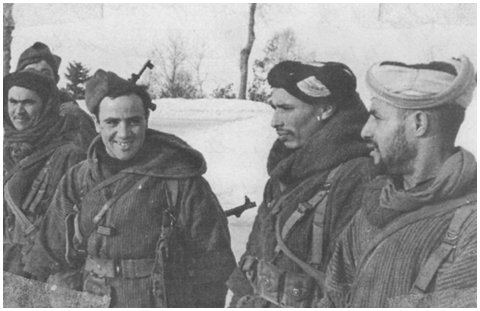
French Moroccan troops in France, winter of 1944-45. They were good soldiers and were used in the mountains.
The man who spoke English came with us. Along the river's edge we found the women. As I remember, there were about five Goums with them. They were armed with Springfield rifles. My buddy and I proceeded to take their rifles and we threw the bolts in the river. The Sicilian man who accompanied us took the women under tow and, we took the Goums back to the depression. We then had to fight the Sicilian men from harming them, but a few threatening moves with our bayonets calmed things down. I asked the man who could speak English if the women were harmed or hurt. He said, "None were harmed."
We gathered up the boltless rifles and then proceeded to the small area where we had camped.I hollered for the Corporal of the guard and who should come flying from his sack but First Sgt. Davis, stark naked, with a .45 cal. pistol in his hand. I asked what I should do with these guys. His answer was turn them loose. I said I had to have an officer's say-so. Captain Carrol spoke and said turn them loose. I asked the captain if he cared how fast I turned them loose and he said no. I took them outside our camp and hollered "Allez tout de suite" and fired five shots in the air and they took off at a high run. During my last haul on guard duty a whole platoon came back wanting their rifles. They were informed to come back in the morning and they would be given their rifles. The next morning Prince who could speak a bit of high school French informed them to leave the Sicilian women alone and returned their rifles.
The next morning Captain Carrol gave a small speech and hoped this incident would not cause an international problem. I heard nothing more. The next day the Sicilians took their women in a cart to the village. A nice wave was presented as they drove by our camp.
The 10th Engineers
I would be criticized if I did not tell some of the stories and deeds that the Tenth Engineer Battalion accomplished during the battles of this war.
One unsung and every day chore was to provide water for troops of the Division and for anybody that happened to be in the area. As I remember it, our Battalion Commander Lt. Col.Petherick said the Division and attached troops needed at least 17,000 gallons per day, about one gallon per man, but under normal conditions 60,000 gallons were needed. This water was chlorinated and distributed from three water points with one point in reserve. Sicily was very short of water and this created a major problem to provide the needed water.
All the engineers were honorary members of the Great Unwashed, and were fed C Rations the whole six weeks. Oh what a jolly war this was going to be were our thoughts, but it only made us mean for what was coming.
Bridge to the Sky
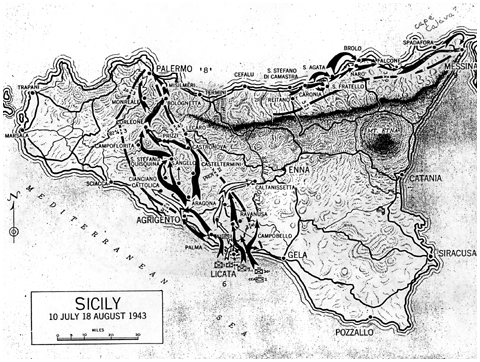
3rd Division in Siciy: July and August 1943
The map of Sicily shows a long straight coastline forming the north coast suggesting a major fault formed this rugged line with many high, sheer cliffs plunging to the sea. Of course there had to be a road along this coast that required tunnels and cuts along these cliffs. At Cape Calava the Germans blew the road off the face of the cliff into the ocean. A Company. of the 10th Engineers got the job of putting the road back on the cliff. The many photos to follow and Ernie Pyle's story from his book Brave Men tells it best. I was there most of the day and I remember this historic event. The job was finished in about 24 hours and we beat the British by that time into Messina. Gen. Truscott gave the Engineers a keg of Cognac for their efforts. The motto for the present day Tenth Engineer. Battalion is now "Bridge to the Sky" in memory of this great accomplishment
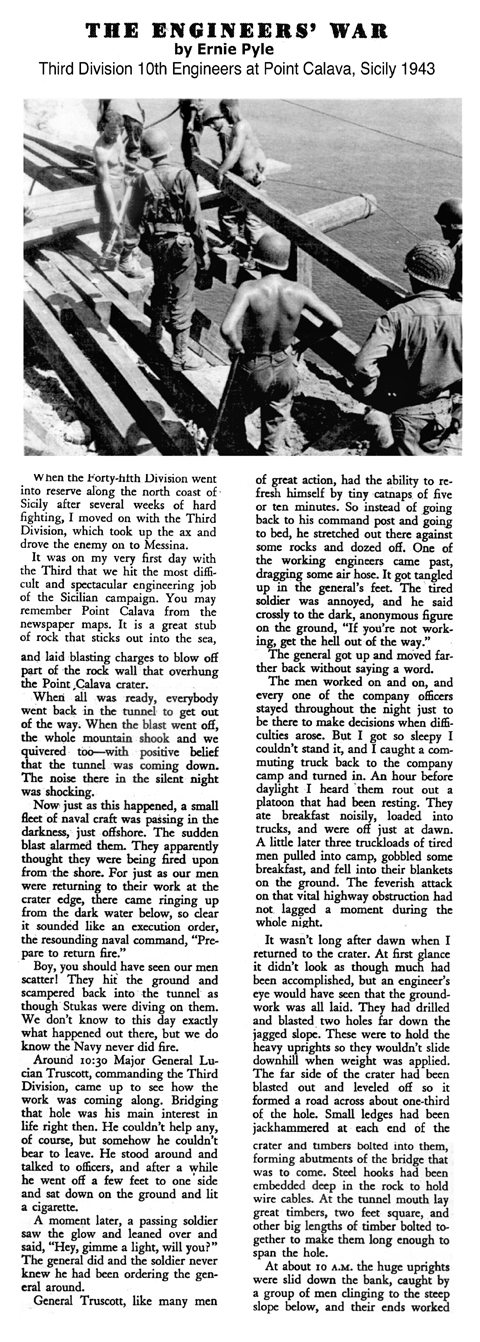



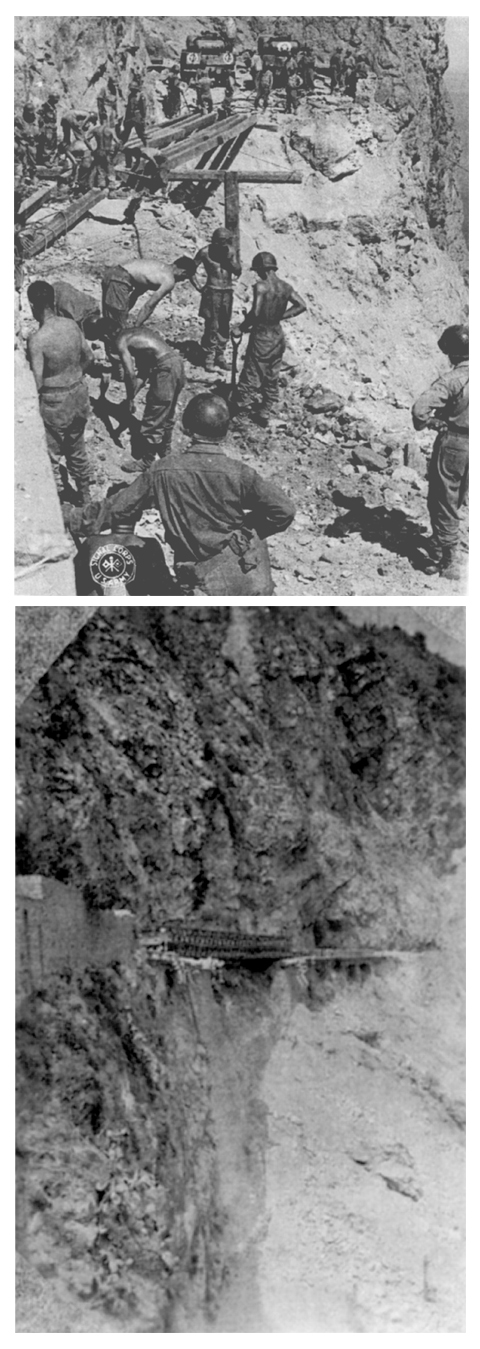
Another little episode that took place while A Co was putting the road back on the face of the cliff occurred because a bulldozer was needed down the road to fill blown parts of the road.
From a small village a couple miles west of Cape Calava the Engineers borrowed three leaky fishing boats about 20 feet long. They took the tarpaulins off there trucks, wrapped them around the boats to keep them from leaking, then put a deck across the boats, and drove the dozer onto the deck. An amphibious jeep towed the boats down the coast around Cape Calava to mend the road to Messina.
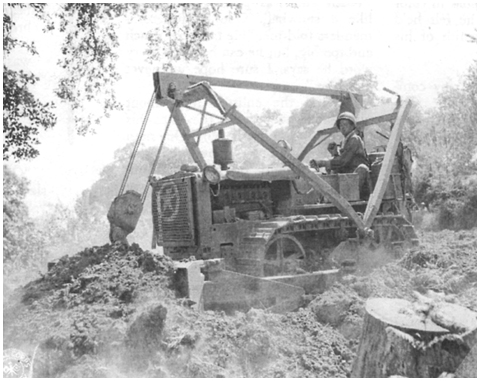
The army bulldozer saved many hours of back breaking labor building roads. The Germans did not have this machine.
Howard B. Nickelson |
Introduction |
Drafted |
Operation Torch.
Conversation Part 1 |
Sicily |
Conversation Part 2 |
Anzio
Breakout |
France |
Germany |
Austria
Memoir appears by permission |